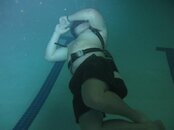KnowledgeIsPower
Registered
Excuse me for how basic this question is, but as a new diver that learned how to dive in cold water, I am a bit confused about dive theory in terms of buoyancy for warm water. What we learned was that we compensate for loss of buoyancy with our BC at depth due to compression of our wetsuits. The other compensation is for loss buoyancy due to loss of air in the tank.
However we recently came back from a tropical dive location where we did 11 dives. We still had to add air to our BC to maintain neutral buoyancy at depth even though we were wearing no wetsuit! Why is this? Is it because we were overweighted? My understanding is that once we achiever Neutral Buoyancy we should have neutral buoyancy at any depth if we are not wearing a wetsuit. If someone could please correct my misunderstanding I would appreciate it!
However we recently came back from a tropical dive location where we did 11 dives. We still had to add air to our BC to maintain neutral buoyancy at depth even though we were wearing no wetsuit! Why is this? Is it because we were overweighted? My understanding is that once we achiever Neutral Buoyancy we should have neutral buoyancy at any depth if we are not wearing a wetsuit. If someone could please correct my misunderstanding I would appreciate it!




